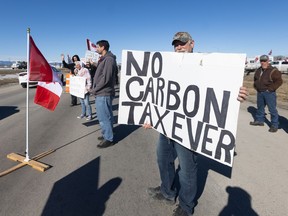A University of Regina economic professor says misleading information has led to the belief that most Saskatchewan residents pay more.

Article content
There have been a lot of questions about what carbon pricing means for people’s pocketbooks. Do we really get more money back in the rebates than we pay? Or does the policy cost us extra?
Let’s start with the basic numbers. The carbon price increased by $15 tonne/carbon dioxide (CO2) on April 1. This translates into 3.3 cents/litre extra on gasoline and 77 cents per gigajoule on natural gas prices.
In a few weeks, tax filers will also get their first ‘Canada carbon rebate’ cheques.
Advertisement 2
Article content
Article content
The size of your rebate depends on how many people are in your household. A family of four living in a city will get $1,504 this year. Is it enough to make up for the carbon pricing charges we pay?
Analysis by Canada’s Parliamentary Budget Office (PBO) and my own research published last year in the Journal of Canadian Public Policy demonstrates that most Saskatchewan households get more back in rebates than they pay in carbon pricing.
Both the PBO and our study find that households with lower incomes are more likely to get more back than they pay. Then why are some groups saying carbon pricing costs us more than we get back in rebates? The answer to that question rests on misuse of a report by the PBO.
The PBO uses an economic model to compare how fast the Canadian economy would grow with and without carbon pricing. This modelling exercise makes two big assumptions.
First, the PBO assumes that if we didn’t have a carbon price, we wouldn’t do anything else to reduce our pollution. Second, the PBO assumes that pollution doesn’t cause any damage. By making these two assumptions, the PBO stacks the deck against carbon pricing.
Article content
Advertisement 3
Article content
They find that we would have a slightly higher income growth rate in a world where climate change didn’t exist, and we could ignore the impacts of our pollution. Unfortunately, climate change is real, it’s caused by burning fossil fuels, and every tonne of pollution we release by burning these fuels causes $271 in damage.
The PBO itself has cautioned against misusing its analysis. As the PBO has clarified “Anything we do with respect to addressing or trying to curb climate change will have costs. It’s either a cost to the carbon tax or regulations to reduce the use of fossil fuel. Regulations also have a cost. Doing nothing would also have costs.”
On March 29, the Regina Leader-Post published a statistic that the average household in Saskatchewan would pay $525 more in carbon pricing than they get back. This number is cherry-picked from the PBO’s report. Along with the modelling problems noted above, there is one other problem with the $525 number.
Even if you overlook the modelling omissions in the PBO report, their results still actually show that the 20 per cent of households with the lowest incomes get an average of $720 extra back per year, and the next 20 per cent of households still get $412 extra back per year.
Advertisement 4
Article content
You only arrive at the $525 per year in average cost number by lumping in impacts to high-income households.
The richest households in Saskatchewan increased their incomes by over $17,000 from 2018 to 2024 in the PBO report, but the PBO says these incomes would have been another $2,766 higher without carbon pricing.
This slower income growth in rich households skews the average when it is added to the gains to low-income earners. It’s kind of like saying ‘the average height of players on my basketball team is six feet tall when you have four people who are 5-foot-6 and one eight-foot-tall giant.
It’s statistically true, but pretty misleading. As Mark Twain famously said, “There are three kinds of lies: lies, damned lies and statistics.” The $525 claim falls into the third category.
As we debate how to reduce pollution in Saskatchewan, let’s be sure we’re clear about the true costs and benefits of carbon pricing.
Brett Dolter is an assistant professor in the Department of Economics at the University of Regina. His research is focused on the economics of climate change policy.
Advertisement 5
Article content
Article content



